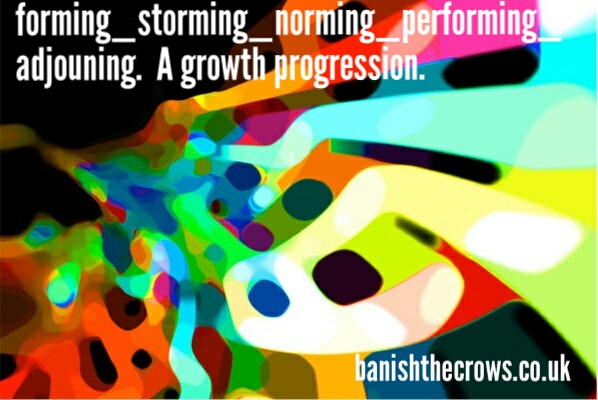
01 Dec Personal growth progression using a group development model – can we do that?
HOW MIGHT THE PSYCHOLOGY OF TEAM AND GROUP DEVELOPMENT APPLY TO INDIVIDUAL GROWTH AND PROGRESSION?
I recently found myself playing around with Psychologist, Bruce Tuckman’s forming-storming-norming-performing-adjourning team and group development model and adapting it to some work that I was doing with a young, adult client around figuring out who they were, where they ‘fit’, their stage in life, and as part of this, normalising some of the fear and angst that they were experiencing.
Tuckman’s model was first proposed in 1965 – he proposing that these phases are all necessary and inevitable in order for a group to grow, face up to challenges, tackle problems, find solutions, plan activity, and make changes with good outcomes.
Why might not this also be true for individuals?
Our individual progression is surely a continuous and unending process, governed by life transitions and phases of our being – birth, growth, emotionality, aspiration, conflict, and mortality? When we take time to step away from our day-to-day lives we can acknowledge our continuous experimentation and responding to life’s certain uncertainty; our adapting and modifying ways of being – changing a job, starting a new relationship and ending others, decline and loss. Then we settle again, take stock, review and continue that cycle of being and becoming and ultimately our being-no-more – those fundamental characteristics of the Human Condition. Our existence can be viewed in a non-linear way – playfully, inventively and experimentally, rather than in a linear, ‘undeviating’ and predetermined way. We can lean into the uncertainty that life is; work with chance and ambiguity and see where this takes us, or become distressed and conflicted by our inability to live certainly.
Adapting Bruce Tuckman’s model didn’t feel like a great stretch when I put my mind to it. Below are my adaptations, which I plan to continue using with clients of all ages – it’s not just for young people starting out in life and trying to figure out ‘the plan’, their plan. The model has something to offer people of all ages and stage in life.
| THE FORMING STAGE | |
| Groups | Individuals |
|
In this stage, some group members are anxious, as they haven’t fully understood what work the group will do. Others are simply excited about the task ahead. Group members’ roles and responsibilities aren’t yet clear but boundaries become formed. This stage can last for some time, as people start to work together, and as they make an effort to get to know their new colleagues.
|
Not fully understanding of the self but excited about the possibilities of what could be. This stage can last for some time – in the personal context maybe it is about acquainting ourselves with ourselves, and others, and testing-out our ideas of us and them? |
| THE STORMING STAGE | |
| Groups | Individuals |
|
People start to push against the boundaries established in the forming stage. This is the stage where many teams and groups fail. Storming often starts where there is a conflict between group members’ natural working styles. People may work in different ways for all sorts of reasons but, if differing working styles cause unforeseen problems, they may become frustrated. Some may question the worth of the collective’s goal, and may become resistive.
|
Pushing against boundaries and established ways and ideas – of the self, others, and society – where we fit. This is the stage where ‘failing’ can be experienced, maybe because our thoughts and ideas about challenging the self, others and society were not fully formed ‘experiments’, or were ill judged? Conflict, frustration, a sense of being overwhelmed and disappointed can be experienced. |
| THE NORMING STAGE | |
| Groups | Individuals |
|
This is when people start to resolve their differences, appreciate colleagues’ strengths, and respect the leader’s authority. Socialising starts to happen, and group members begin to ask one another for help and provide constructive feedback. People develop a stronger commitment and progress the collective goal.
|
Gradual; resolving intra-personal differences, appreciating strengths in the self and then others, locating respect, too. Know self and others better; able to be with self and others, productively. Shared commitments and goals emerge? Progress is seen and built upon. |
| THE PERFORMING STAGE | |
| Groups | Individuals |
|
The team or group reaches the performing stage when hard work leads, without friction, to the achievement of the collective goal. The structures and processes established support the shared endeavour well. Delegation and development of individuals can now occur. It feels easy to be part of the group at this stage, and people who join or leave won’t easily disrupt performance.
|
Achievement of aspirations and goals is either clearly possible or experienced. The internal emotional and psychological structures and processes that you have worked with – confronted even, support this stage well. There is a sense of our grounding. Now is the time to concentrate on further, future development – new existential ‘experiments’ and ‘projekts’. It feels easy to be with the self and others, and our wider world objectives, now. |
| THE ADJOURNING STAGE | |
| Groups | Individuals |
| Many teams and groups will reach this ‘stepping down’ or ‘stepping back’ stage eventually. For example, some exist for only a fixed period, and even permanent teams and groups may be disbanded through restructuring processes.
Those individuals who like routine, or who have developed close working relationships with colleagues, may find this stage difficult, particularly if their future now looks uncertain. |
Review of uncertainty, stability, and continuity. Taking a breath. Reflecting on life structures and processes that need to stay and have served the self and perhaps others in our relating, well. More of this, less of that – and what about this…?
|



No Comments